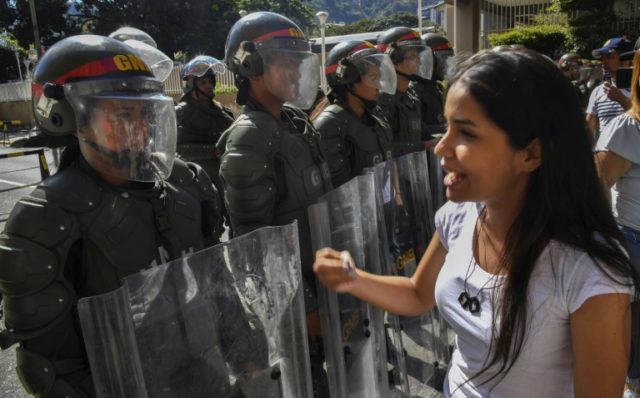The advocacy group Human Rights Watch (HRW) urged Venezuelan President Juan Guaidó and the nation’s legislature on Thursday to reconsider what it described as an “imprecise and vague” law passed to grant amnesty to soldiers who stop taking orders from dictator Nicolás Maduro.
Guaidó launched a campaign Wednesday – the one-week anniversary of his inauguration – to raise awareness among troops of the law, which ensures that, no matter the human rights abuses a soldier committed under Maduro’s orders, he or she will not face prosecution if choosing to abandon Maduro and help reinstate the democratic order in the country.
Human Rights Watch suggests that the law sets a dangerous precedent when applied to individuals guilty of gross human rights violations and may be unconstitutional.
“The imprecise and vague provisions the amnesty law project contains may permit a guarantee of impunity to state agents responsible for grave abuses,” José Miguel Vivanco, the Americas director for HRW said in a statement published by the organization. “Any amnesty that prevents investigating and processing public officials and soldiers responsible for grave violations of human rights is incompatible with Venezuela’s international legal obligations.”
HRW goes on to say in its statement that the current amnesty law “uses very ample terms and does not specify which crimes the amnesty will cover, nor does it explain what the process will be for its implementation.”
The group also notes that Venezuela’s constitution prohibits granting amnesty to human rights violators. Article 29 of the constitution reads in part, “The State will be obligated to investigate and legally sanction crimes against human rights committed by its authorities … such crimes are excluded from beneficial acts that can lead to impunity, including pardon and amnesty.”
Guaidó has referred to the amnesty law on multiple occasions as necessary to ensure that Maduro does not continue to control the nation’s military, which he has used for years to torture, imprison, and kill pro-democracy dissidents. In a public appearance Wednesday, Guaidó announced a campaign of awareness for the law, urging civilians to reach out to the soldiers in their lives, print out the amnesty law, and explain to them that they will not face prosecution if they abandon Maduro.
“We are extending our hand, we are telling those officials to come to our side, we have a future. Maduro protects no one – not from persecution, not from hunger, not from misery – but there is a future with us,” Guaidó stated.
In an interview last week with Univisión’s Patricia Janiot, Guaidó went as far as to state that Maduro himself could benefit from the amnesty law.
“He is an official, a public official, a dictator responsible for the victims yesterday in Venezuela,” Guaidó said. “[Yet] in transition periods, similar things have happened. It happened in Chile, it happened in Venezuela in 1958. We cannot discard any options, but we have to be firm towards the future.”
Guaidó appeared to change his tune in an interview with Vice News which occurred after soldiers entered his home, threatening his wife and ten-month-old daughter, on Thursday afternoon.
“Even in war, and the mafia, there is a respect and a code. And the family is sacred,” Guaidó argued. “This has not been preserved. They must have consequences.”
The amnesty law remains in vigor, however. There is no sign of a mass defection yet, and Maduro has continued to flood his social media accounts with images of himself in military fatigues jogging and using military equipment during training with soldiers.
The NGO Venezuelan Penal Forum estimated late last week that the Maduro regime is holding as many as nearly one thousand people in political prisons; upwards of 800 of them have been arrested since Guaidó took the oath of office last week. Those who have survived Venezuela’s prisons say the military – aided by Cuban government agents – regularly rape, beat, and torture political prisoners with food and sleep deprivation. Lorent Saleh, a political prisoner recently released from one of Venezuela’s most notorious prisons, told media following his release that he saw military guards crucify prisoners and forced them to beat each other, before ultimately torturing those who agreed to beat a fellow prisoner more than their victims.
“I have seen prisoners offer to abuse other prisoners, thinking that they would thus avoid being abused themselves, and of course that didn’t happen. They were abused too, and even moreso,” Saleh explained. “Because nobody, not even the guards, trusted them.”

COMMENTS
Please let us know if you're having issues with commenting.